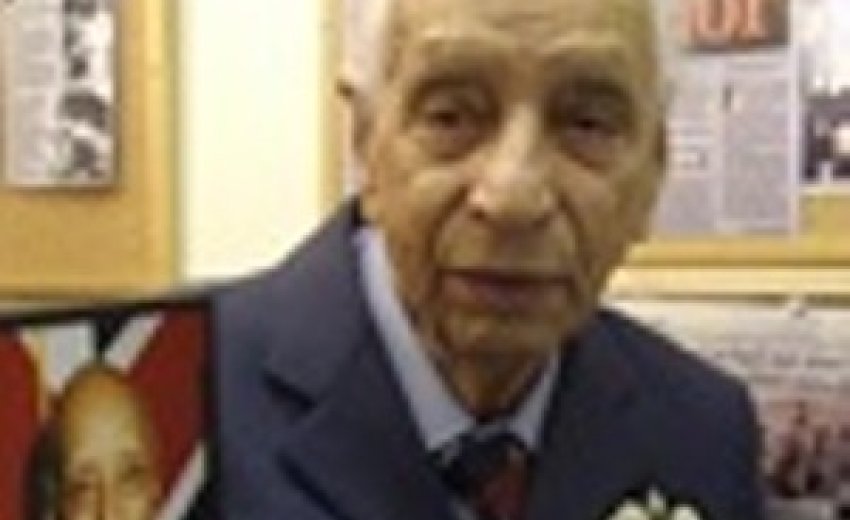Mohinder Singh Pujji
 As the 70th anniversary of the Battle of Britain approaches, a Sikh fighter pilot has told how his life was saved by the padding in his turban after he was forced to crash land his fighter aircraft near Dover following a dogfight.
As the 70th anniversary of the Battle of Britain approaches, a Sikh fighter pilot has told how his life was saved by the padding in his turban after he was forced to crash land his fighter aircraft near Dover following a dogfight.
Squadron Leader Mohinder Singh Pujji, one of the few Indian ace flyers in the RAF, crash landed after his plane was shot down in a mid-air skirmish.
He managed to get his Hurricane fighter plane down and rescuers helped the young flyer, who crash landed near the White Cliffs of Dover, and pulled him from the wreckage with bad head injuries.
But Sqdn Ldr Singh Pujji, now 91, explained how his specially adapted turban headgear – a requisite of his religion - even had his wings sewn onto it.
The reinforced covering acted as a cushion for the crash-landing preventing the young flyer’s death.
He told of his daring wartime exploits ahead of his memoirs which are due to be published later this year, called, For King and Another Country.
The former RAF ace said: “The padding of my turban saved me, it was full of blood. I was taken to the hospital but after seven days I was back to flying again.
“In the fight a German bullet smashed into my dashboard and all my instruments were gone. Oil was pouring out of the engine and covered the windscreen. “I asked for directions back to the nearest landing strip as I could see the Channel beneath me and it looked so cold – I really didn’t want to bail out. I could see the White Cliffs and I thought I would make it and then the landing strip appeared with fire engines around it.
But as I put my landing gear down the fire took hold of the plane – there was blood pouring from my head but that six feet of wound cloth, which makes up my turban, saved me from worse impact injuries. People say you claim this as you are a religious man but I really think it was the case.
The aircraft was a total wreck. I was dragged out and I heard voices saying, ‘He's still alive, he's still alive’. Because my eyes were closed I couldn't see.”
Sqdn. Ldr. Pujji explained his turban was fitted so the earphones could go over the top and that he carried a spare in his cockpit.
He said: “I had a special strap made to hold my earphones. I used to carry a spare turban with me so I would have one if I got shot down. I thought I was a very religious man, I shouldn't take off my turban. The Germans created havoc all over the UK. That's why I felt I was fighting a just cause. I knew why the war broke out and who Hitler was.
Why did Britain go to war? It went to war to save Europe and I went to war for Britain. I saw the people here and had admiration for them.”
Sqdn Ldr Singh Pujji surrounds himself with wartime memorabilia at his sheltered accommodation block in Gravesend.
He said he signed up for the RAF after responding to an advert declaring ‘Pilots needed for Royal Air Force’ in an Indian newspaper.
And after learning to fly in 1937 he was one of only eight pilots from the Empire colony deemed good enough for fighter duties.
Arriving in August, 1940, at the height of the Battle of the Britain which raged in the skies over Kent, the young officer then flew countless missions against Hitler's Luftwaffe as the bombers and fighters flew sorties across southern England.
He said: “Every day was a question of life and death. Every flight we made we weren't sure we were going to come back.
It's a job which can't easily be described, escorting convoys over the English Channel, going over occupied countries looking out for enemies, escorting bombers and making interceptions. In one minute we would have to be strapped in and up in the air ready to meet enemy fighters. This was three to four times a day, throughout six months.”
He had another lucky escape when he was shot down by ground fire from Rommel's Africa Korps in the Western Desert in north Africa.
He said: “I didn't know what to do. I wasn't on fire, I didn't get hurt. I knew if I carried on north, I would get to the Mediterranean, but any other direction I knew nothing. I gave up and sat on top of my plane and after a while I saw a cloud of dust. I did not mind who it was picking me up, Germany or Britain. I started waving my shirt and luckily it was the British.”
In all, Sqdn. Ldr. Pujji saw action in five theatres of war – Europe, Africa, The Middle East, Palestine and Asia. He is the only man to hold that distinction.
“Afghanistan was like it is now – fighting against rebel tribesmen,” he said. “On one occasion one of my boys was shot down and they cut up his body and sent it to me in a bag. What sort of war was that?”
He finished the war in Burma but was then invalided out from the RAF suffering from tuberculosis. After the war he resumed his career with Shell Oil before running an aerodrome for the Indian government.
Sqdn. Leader Pujji, who was awarded the Distinguished Flying Cross for his bravery, hit the headlines last year after campaigning against the BNP.
He was angered by party leader Nick Griffin's use of the iconic Spitfire to symbolise Britishness.
